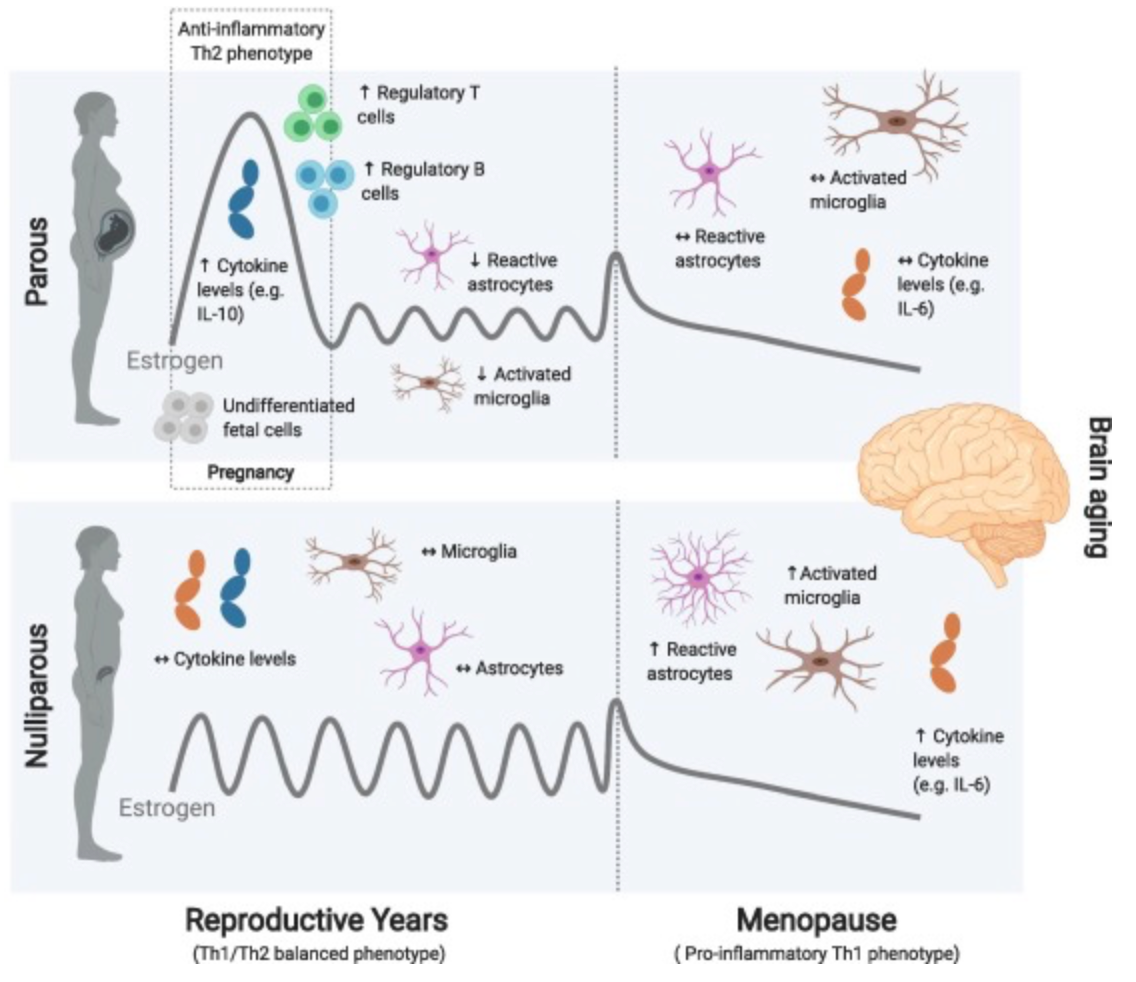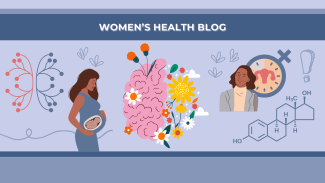Authors: Hannah Oppenheimer, PhD student, Arielle Crestol, PhD student, Claudia Barth, Senior Researcher/PI FemHealth Project, Division of Mental Health and Substance Abuse, Diakonhjemmet Hospital, Oslo, Norway | Editors: Romina Garcia de leon Reviewer: Magdalena Martínez-Garcia
Published: June 21st, 2024
There are clear sex and gender differences in several brain-related disorders. For example, relative to men, the lifetime risk for depression is twice as high in women*, and twice as many women develop late-onset Alzheimer’s disease. But what’s causing these differences?
While the underlying reasons are not yet fully understood, sex hormones and inflammatory processes (i.e., the immune system’s response to irritants such as pathogens), are thought to play important roles. Women’s lifespans are marked by major hormonal and immune-related changes, particularly during pregnancy and menopause. Research suggests that these phases are important for brain health and mental health, both in the short-term and long-term.
What happens during pregnancy that affects brain health and mental health?
During pregnancy, the immune system fluctuates between three immunological stages with unique inflammatory profiles, each corresponding to a trimester. The first is a pro-inflammatory stage, where inflammation is enhanced to allow for the implantation of the embryo and the formation of the placenta. This is followed by an anti-inflammatory stage, namely a reduction in inflammation to support the growth of the fetus. The final stage is again pro-inflammatory and helps initiate birth. A successful pregnancy depends on the adaptation of the maternal immune system to each of these stages. The stages are also linked to hormonal changes such as rises in estradiol — the most abundant form of estrogen in women — which play a vital role in creating an anti-inflammatory immune environment.
Alongside the hormonal and immunological changes, pregnancy and the postpartum period also impact the mother’s neuroplasticity, that is, the brain’s ability to change. Changes in brain volume during pregnancy and postpartum have been associated with fluctuating estradiol levels. These changes can be beneficial! A recent study showed that cortical brain volume changes follow a U-shaped trajectory whereby volume decreases during pregnancy and increases again postpartum. Both the reduction and the increase in volume throughout this trajectory have been linked to a higher mother-to-infant attachment later on, thereby potentially helping women transitioning to motherhood. However, some of these brain changes may also lead to increased vulnerability to mental disorders such as depression, which affect almost one in five women during and after pregnancy.
Do all changes revert postpartum?
While some of the maternal brain changes revert shortly after giving birth, other changes may sustain for years or even decades. Possible long-term impacts of pregnancy on the brain have been shown in studies that found younger-looking brains in middle-aged women with biological children compared to those without (see image). This effect may be linked to the exposure to hormones and inflammatory markers during pregnancy. Furthermore, regulatory T cells — cells that play a critical role in stopping immune responses when no longer needed and show an increase during pregnancy which persists postpartum — may reduce risk for Alzheimer’s disease later in life. Another mechanism which may be involved in the relationship between pregnancy and long-term brain health through its effects on the maternal immune system is fetal microchimerism — the lasting presence of fetal cells in the mother’s body long after giving birth.
What happens during menopause?
Hormonal and immune-related changes during the menopause transition are thought to be the basis for menopausal symptoms which are largely neurological in nature, such as hot flashes and night sweats, mood and sleep disturbances, and trouble with memory and cognition. The transition to menopause has also been linked to changes in the brain and a heightened risk of depression. For some women, symptoms and brain changes may stabilize, or even revert after menopause. However, the presence and severity of these symptoms may increase the likelihood of developing Alzheimer’s disease in older age.
With the transition to menopause, estradiol levels decline and again influence the immune system. A balance between pro-inflammatory and anti-inflammatory responses during the reproductive years can shift to an imbalance leaning towards more pro-inflammatory responses during the transition to menopause. This process can get exacerbated in a subset of women, leading to negative health outcomes. Research suggests that the anti-inflammatory processes associated with pregnancy may shape the emerging inflammatory processes during menopause, and thereby influence later brain health.
Overall, pregnancy and menopause are transition phases encompassing hormonal and immune-related changes, which can have short-term and long-term effects on women’s brain health and mental health. Scientists are still working to better understand the implications of these relationships, including their role in disorders with large sex differences. Once that is better understood, this knowledge may help pave the way for better treatments, disease prevention, and individualized care.
Potential Effects of Pregnancy on Brain Health Through Hormonal and Immune-Related Changes

Research has found differences in brain health between women with biological children (parous) and women without (nulliparous).
*Although we acknowledge that individuals who are biologically female (i.e., XX) do not always identify as women, we used the gendered term “women” to align with common language usage.
